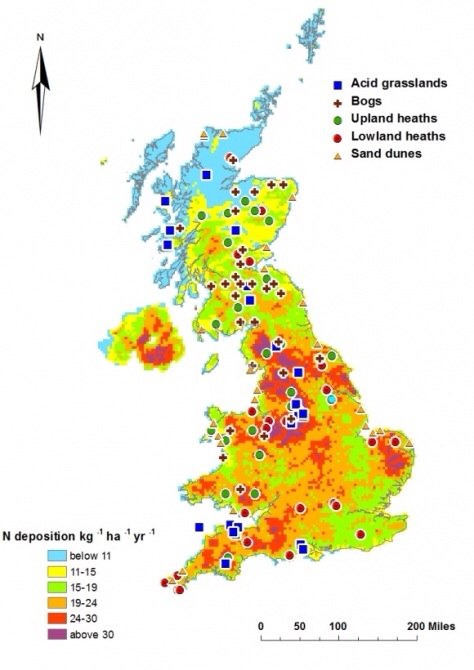A team of MMU ecologists have concluded that atmospheric nitrogen from fossil fuel emissions and agriculture is a major factor in a massive reduction in the biodiversity of plants across Britain.
The research shows that the variety of plants could be cut by up to forty per cent, leading to some plants becoming dominant and affecting the delicate balance of habitats.
Researchers say that without further control of nitrogen pollution, ecosystems will create identical habitats with just a few all-powerful florae in some of the most picturesque locations in the UK.
The team, led by Dr Christopher Field and Professor Simon Caporn, conducted the most comprehensive targeted survey of its kind to research the effects of nitrogen deposition on vegetation at 135 sites across the UK and the survey uniquely sought to simultaneously examine the relationship between species richness and composition in five of the UK’s key semi-natural habitats.
They found that as pollution increased then species richness declined, with nitrogen deposition the main driver of reduction. Nitrogen is a vital nutrient for plant growth but too much can cause a few species to become dominant.
Dr Christopher Field said: “The more pollution, the fewer species, so the consequences are less biodiversity in the ecosystem and many of the plants that we love will be gone.
“Atmospheric nitrogen has increased as a by-product of fossil fuel burning and intensifying agriculture in industrialised countries, with further increases predicted in developing nations.
Data for the study, published in the international journal Ecosystems, was collected from a range of habitats: acid grassland, bog, upland heath, lowland heath and sand dune, and across a climatic gradient from north Scotland to south west England.
Researchers examined the biodiversity of mosses, lichens, forbs and grasses. They recorded the percentage cover of each plant, plant species richness, key site characteristics, and sampled soil and vegetation for laboratory analysis.
“Ultimately” said Dr Field, “without further reduction in nitrogen emissions, one species can take over and stop diversity by establishing itself as the dominant species.”
“We are seeing more convergence in our ecosystems and a drift towards monocultures, with increased dominance of fast-growing species such as grasses. Careful management of nitrogen emissions are now required.”







